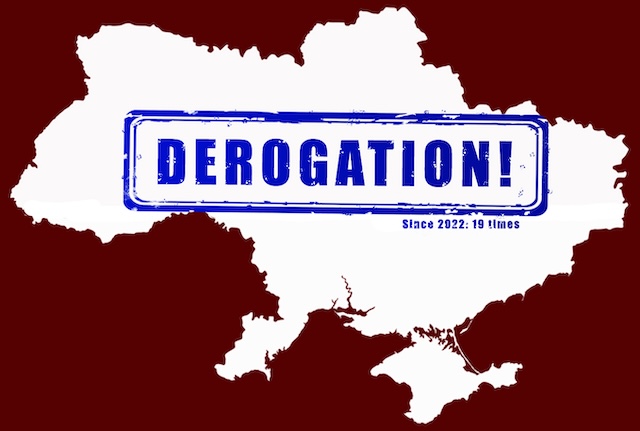What is Derogation — Protection from Expulsion, Deportation, and a basis for Asylum

1. Derogation in International Law
Derogation is an official legal term that refers to the temporary suspension by a state of its obligations to protect human rights. It is applied in situations of war, a state of emergency, mass unrest, or another exceptional threat to the life of the nation. When a state declares a derogation, it notifies international organizations — such as the Council of Europe or the United Nations — that it is unable to fully comply with the rights enshrined, for example, in the European Convention on Human Rights (ECHR) or the International Covenant on Civil and Political Rights (ICCPR).
Such a suspension is regulated by:
• Article 15 of the European Convention on Human Rights (ECHR)
• Article 4 of the International Covenant on Civil and Political Rights (ICCPR)
A state that introduces a derogation must officially notify international bodies (e.g., the Council of Europe and the UN), list the articles it is derogating from, justify the necessity, and specify the territory and time frame.
Even under derogation, certain absolute rights may not be limited under any circumstances:
the prohibition of torture, extrajudicial executions, slavery, the right to recognition as a person before the law, and the prohibition of retroactive criminal prosecution.
2. How Ukraine Applied the Derogation Regime
Since 2015, Ukraine has submitted official notifications of derogation to the Council of Europe and the United Nations in connection with the armed conflict in the Donetsk and Luhansk regions.
After the full-scale war began on February 24, 2022, Ukraine extended the derogation regime to the entire territory of the country. This was formalized in a note dated March 10, 2022, and was based on the Law of Ukraine No. 2111-IX.
Between 2022 and 2024, the Ukrainian government submitted at least 19 notifications of derogation, covering dozens of rights and freedoms.
On April 4, 2024, Ukraine partially lifted some of these restrictions. However, as of 2025, the key articles remained under derogation.
3. List of Rights Officially Derogated by Ukraine
European Convention on Human Rights (ECHR):
• Article 5 — right to liberty and security of person
• Article 6 — right to a fair trial
• Article 8 — right to respect for private and family life
• Article 10 — freedom of expression
• Article 11 — freedom of peaceful assembly and association
• Article 13 — right to an effective remedy
• Article 14 — prohibition of discrimination (within the scope of restricted rights)
• Article 15 — right of a state to derogate
• Protocol No. 4, Article 2 — freedom of movement and the right to leave a country
• Protocol No. 7, Article 1 — procedural safeguards relating to expulsion and deportation
• Protocol No. 7, Article 4 — prohibition of double jeopardy
Note: Article 16 of the ECHR (on the state’s right to restrict the political activity of foreigners) is not included, as it is not among the rights from which derogation is permitted under Article 15 of the Convention.
On April 4, 2024, Ukraine partially withdrew its derogation from Articles 13 and 14 of the ECHR, as well as from Article 16 of the International Covenant on Civil and Political Rights, but most restrictions remain in effect.
International Covenant on Civil and Political Rights (ICCPR):
• Article 2(3) — right to an effective remedy
• Article 4 — right of derogation in times of emergency
• Article 9 — right to liberty and security of person
• Article 12 — freedom of movement
• Article 13 — procedural guarantees in expulsion of aliens
• Article 14 — right to a fair trial
• Article 16 — right to recognition as a person before the law
• Article 17 — right to respect for private and family life
• Article 26 — equality before the law and protection against discrimination
On 4 April 2024, Ukraine partially withdrew its derogation from Articles 13, 14, and 16, but restrictions under the other articles of the Covenant remain in force under martial law.
4. How to Use the Derogation Regime for Refugee Protection
When a derogation is in effect, the state loses its status as a “safe country of origin” within the meaning of EU law and the UNHCR framework.
The fact of an official derogation is the state’s acknowledgment of its inability to guarantee a number of fundamental rights, even throughout its entire territory. This creates grounds for:
• filing an asylum application
• challenging extradition, deportation, or forced return
• extending temporary protection
• submitting complaints to international bodies (ECtHR, UN committees)
• refusing cooperation with Ukrainian law enforcement agencies in the absence of legal safeguards
The existence of a derogation deprives the Ukrainian legal system of the presumption of safety. This means that returning a person to a country that has officially suspended its human rights obligations contradicts international standards of protection.
If a state acknowledges that it cannot guarantee human rights, and a Ukrainian is a potential or actual victim of such violations, a Ukrainian citizen has a valid legal basis for seeking asylum. International law — including the 1951 Geneva Convention and the European Convention on Human Rights — allows for the granting of asylum not only in cases of individual persecution, but also in situations of systemic human rights violations in the country of origin.
This is especially relevant for those subject to conscription, those persecuted for religious beliefs, pacifism, opposition views, rejection of violence, criticism of the authorities, or those simply trying to preserve their physical and psychological integrity.
In the context of an official derogation, a person may directly invoke the fact that their country no longer provides legal protection mechanisms and, therefore, they are not obliged to remain under a jurisdiction that has acknowledged its inability to protect them.
This is also relevant for Ukrainians currently facing forced return: those whose asylum applications were rejected or who were assigned a “temporary protection” status.
It is fully legitimate to refer to the fact of derogation as evidence that Ukraine is not a safe country of origin. Even in the absence of an official conviction or criminal prosecution, the mere risk of violence by the state — without access to a fair trial or legal remedies — may already constitute grounds for asylum.
It is essential to explain this in court, to lawyers, and in applications: the state has abandoned its international obligations, and the Ukrainian has been left without rights.
Even without an official sentence or prosecution, the risk of state abuse and the absence of protection mechanisms under a derogation is in itself sufficient justification for asylum.
Moreover, any deportation, extradition, or forced return of Ukrainian nationals under conditions of an official derogation constitutes a violation of international law. Such actions contradict:
• Article 3 of the European Convention on Human Rights (absolute prohibition of inhuman or degrading treatment)
• Article 33 of the 1951 Geneva Convention (principle of non-refoulement)
• Article 3 of the UN Convention Against Torture
If such return leads to conscription, arbitrary detention, political persecution, or violence, liability lies not only with the receiving country but also with the country that carried out the removal. This falls under:
• Article 16 of the Articles on Responsibility of States for Internationally Wrongful Acts (aiding in the commission of an internationally wrongful act)
• Article 25(3)(d) of the Rome Statute of the International Criminal Court (contributing to crimes against humanity)
Returning a person to a country that has officially renounced the observance of fundamental human rights is not just a diplomatic error — it is an internationally wrongful act subject to legal accountability.
5. International Responsibility of Donor States
States that continue to finance Ukrainian government structures without legal safeguards may be held internationally responsible. This applies to:
• the forced deportation of individuals to a country under a derogation regime
• the financing of institutions that violate rights from which the state itself has officially derogated
• complicity in repression, forced conscription, and arbitrary detention in the absence of legal oversight
Such actions fall under:
• Article 16 of the Articles on Responsibility of States for Internationally Wrongful Acts (aiding or assisting in the breach of international obligations)
• Article 25(3)(d) of the Rome Statute of the International Criminal Court (contributing to crimes against humanity)
• Article 3 of the European Convention on Human Rights (prohibition of inhuman or degrading treatment)
Derogation is not a theoretical concept. It is an active legal regime under which a state officially acknowledges that it can no longer guarantee the protection of certain fundamental rights and freedoms.
6. Conclusion
This means that a Ukrainian citizen is under the authority of a state that has officially recognized its inability to ensure their basic rights.
Returning to such a country is unsafe. Financing its repressive structures is complicity. And deportation, extradition, or denial of asylum constitute violations of international law.
Ukrainian citizens abroad have the full right to invoke the derogation regime as a legal basis for their international protection. And every state that claims adherence to international standards is obligated to recognize that.


